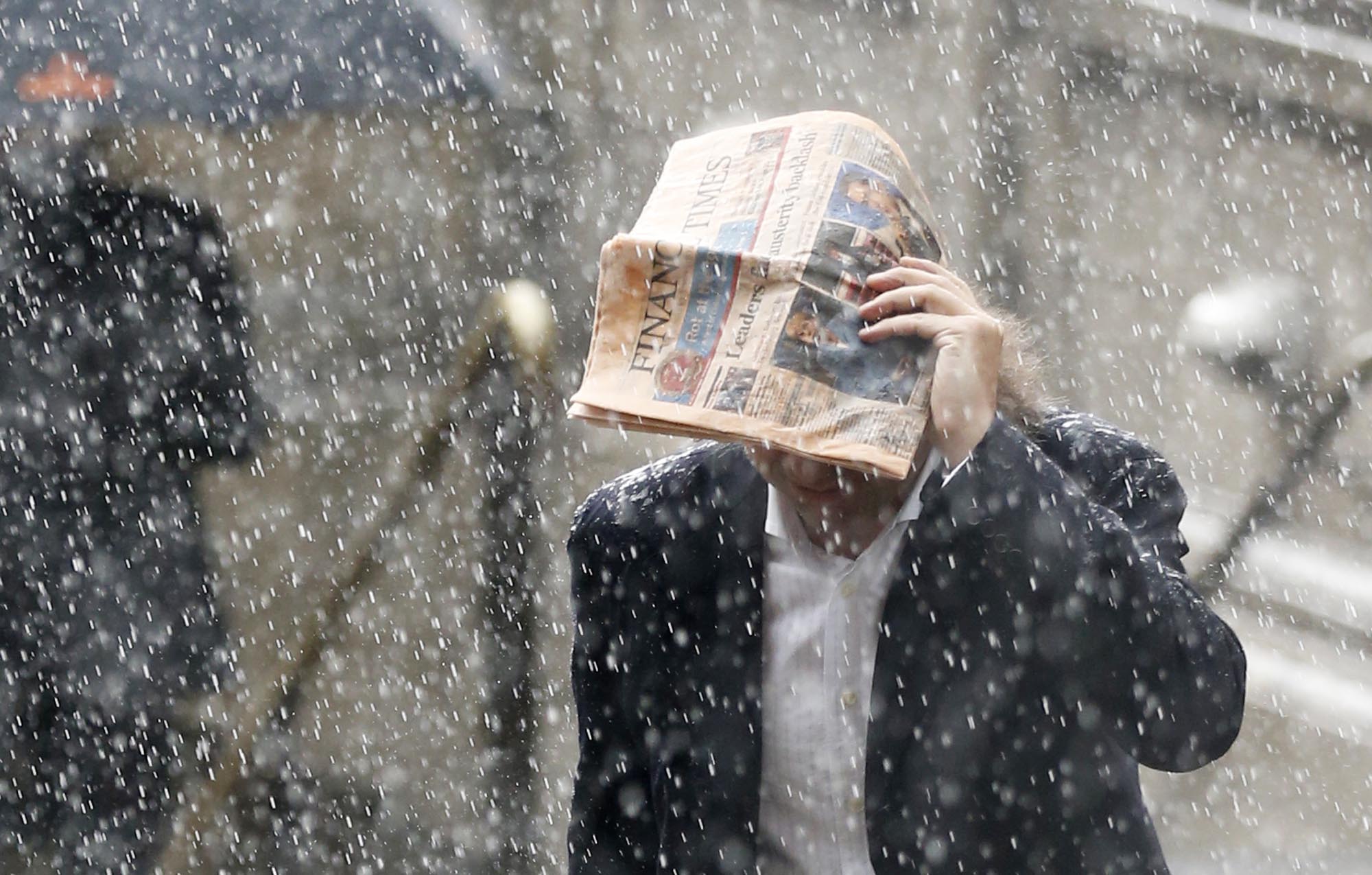 A man shelters under a copy of the Financial Times newspaper as he runs through a heavy rain shower outside the Bank of England in London. Sodden fields. Puddles. Floods. This is what drought looks like in Britain. Last month, water authorities banned 20 million homeowners from using hoses to water their lawns or wash their cars, saying two of the driest winters on record had plunged much of Britain into drought. Since then, the rain has hardly let up.
A man shelters under a copy of the Financial Times newspaper as he runs through a heavy rain shower outside the Bank of England in London. Sodden fields. Puddles. Floods. This is what drought looks like in Britain. Last month, water authorities banned 20 million homeowners from using hoses to water their lawns or wash their cars, saying two of the driest winters on record had plunged much of Britain into drought. Since then, the rain has hardly let up.By JILL LAWLESS
LONDON - Sodden fields. Deep puddles. Flash floods. This is what drought looks like in Britain.
Last month, water authorities banned 20 million U.K. homeowners from using hoses to water their lawns or wash their cars, saying two exceptionally dry winters had plunged much of Britain into drought.
Since then, the rain has hardly let up. Official figures show that April was both cooler than average and the wettest in a century, leaving a trail of flooded properties, canceled events and grumpy residents.
But officials insist the drought and the watering ban remain - to the bafflement of many Britons.
In eastern England, Daniel Allen noted with irony that he's been told he can't water the lush foliage in the grounds of his riverside pub, the Rushbrooke Arms - "which is incredible as I had a river running through it yesterday."
The River Lark usually runs past the thatched pub in Sicklesmere village as a trickle.
"Yesterday the river was lapping into our yard. It filled up the car park completely," Allen said.
On Friday, Sicklesmere was one of 22 sites under Environment Agency flood warnings, meaning flooding is likely. The agency issued a further 61 flood alerts across England.
The national weather service, the Met Office, says 12.6 centimeters (5 inches) of rain fell across the country in April, almost double the monthly average and a record since records began in 1910.
High-profile casualties of the weather include the venerable Badminton Horse Trials - due to start Thursday but canceled for the first time in a quarter-century because of a waterlogged course.
Rain also speared the British Asparagus Festival, which was scrapped due to a flooded riverside venue and a waterlogged crop.
"We were expecting asparagus to be scarce due to the unseasonably good weather at the start of the year followed by the recent deluge," said festival organizer Angela Tidmarsh. "However, this week's flooding means that the asparagus crop is almost completely dormant."
Looking ahead, there are fears the rain could take the bloom off the Chelsea Flower Show, the premier event on Britain's gardening calendar, slated for May 22-26.
Yet there is no end in sight to restrictions forbidding millions from using hoses to water lawns and plants, wash cars or windows or fill ponds and swimming pools.
The water firms say rivers and reservoirs remain low, and it will take a wet winter to restore normal conditions.
"It's going to take more than a week or two of rain to undo the effects of nearly two years of below-average rainfall," Environment Agency water resources expert Tony Bishop wrote in a blog that tried to answer the deluge of questions. "As we move from spring to summer, most of the rain that falls is either evaporated as temperatures rise or taken up by plants as they grow."
Critics of the water hose ban note the vast amount of water lost by the companies through leaks - 3.3 billion liters (870 million gallons) a day last year, according to regulator Ofwat.
They also say the current system does nothing to encourage water conservation. Most British households pay a flat fee for water use, so there's no financial incentive to use less.
The Environment Agency says Britons use 150 liters (40 gallons) of water per person per day - less than the United States but more than their European neighbors.
In the end, meteorologists say there may be no one to blame for the damp drought except the notoriously unpredictable weather in Britain, a small island nation in a big ocean.
"Springtime in the U.K. is generally quite a changeable season - and that has been illustrated superbly during the last few months," said Met office forecaster Charlie Powell.
---
Jill Lawless can be reached at http://twitter.com/JillLawless